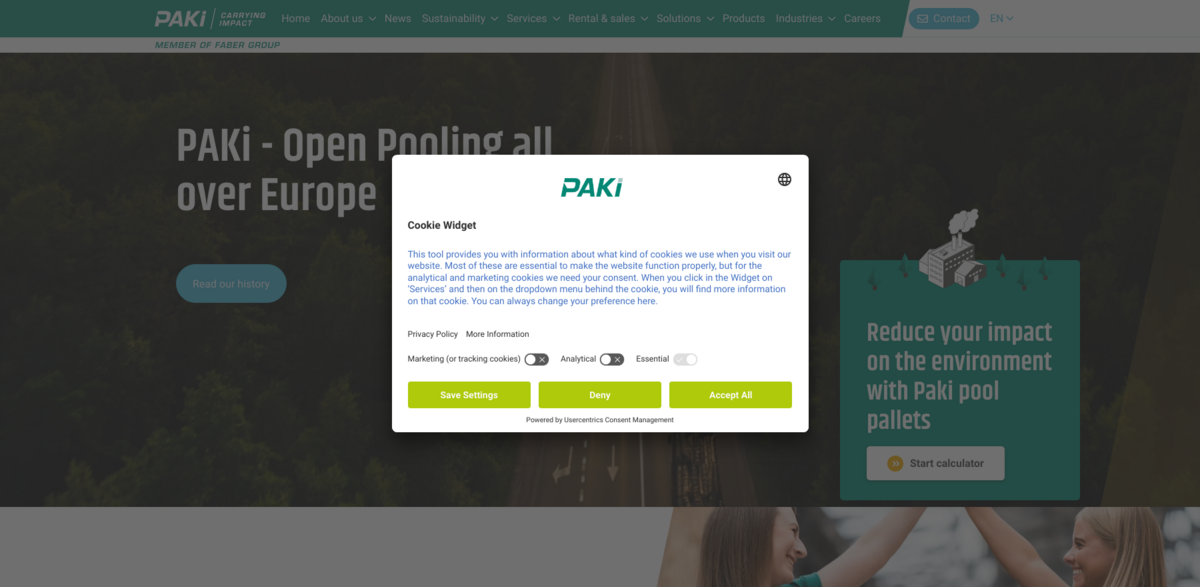What is PAKi Logistics?
PAKi Logistics is the go-to open pooling service provider for managing, delivering, and exchanging standardized exchangeable pallets and containers all across Europe. With over 45 years of expertise, PAKi uses digital solutions to organize and streamline logistics, making load-carrier management quick, efficient, and environmentally friendly. Their extensive European network of pick-up and drop-off locations, known as ‘PAKi Spots,’ helps transport companies, retailers, and manufacturers handle their specific load carrier needs with ease. Simply put, PAKi takes care of the logistics so businesses can focus on what they do best.
Main Benefits of PAKi Logistics
PAKi Logistics offers a range of impressive benefits that make it a leader in the open pooling market:
- More than 500 million Euro pallets managed in the open pool
- Over 200 employees across 23 countries, responding in 13 languages
- A network of thousands of PAKi pick-up and drop-off sites throughout Europe
- Significant reduction in CO2 emissions by avoiding empty runs
- Digital and paperless services that save valuable resources and time
- Reusable load carriers that help reduce waste and support sustainability goals
The History Behind PAKi Logistics
Founded in 1974 by logistics experts who saw the potential in exchangeable load carriers, PAKi has been a pioneer in the industry ever since. The company played a key role in founding the European Pallet Association (EPAL) in 1991, helping to establish a reliable, pan-European open pool system. In 2012, PAKi became part of the Faber Halbertsma Group, which later rebranded as the Faber Group in 2021. The Faber Group brings over 130 years of manufacturing experience in wooden load carriers, including developing the first wooden pallet with an ISO 9001 quality certificate back in 1993.
Innovations and Developments
PAKi Logistics has never shied away from innovation. In 2012, they revamped the 1.4 plastic quarter pallet, creating a model made entirely from recycled materials that also allowed for easy attachment of POS displays. Following that, they redesigned the Düsseldorf 1.2 half pallet, both now fully managed by the IPP pooling system. Then, in 2015, PAKi became the first provider to offer the ECON collapsible Euro container across Europe—a plastic container with the same dimensions as a box pallet but collapsible for compact storage. These developments highlight PAKi’s commitment to improving logistics with smart, sustainable solutions.
PAKi’s Commitment to Sustainability
At the heart of PAKi’s operations lies a strong dedication to sustainability. They believe in offering high-quality, reusable, and eco-friendly services that benefit both clients and future generations. By promoting the reusability of pallets and boxes, PAKi helps reduce resource consumption and waste in supply chains. Their open-pool logistics system minimizes empty runs, which significantly cuts down CO2 emissions from lorry fleets. Plus, their digital and paperless processes save time and valuable resources, making logistics greener and more efficient.
Impact on Sustainable Development Goals (SDGs)
- SDG 9: Industry, Innovation, and Infrastructure – through innovative pooling and logistics solutions
- SDG 12: Responsible Consumption and Production – by promoting reusable load carriers and reducing waste
- SDG 13: Climate Action – via significant reductions in CO2 emissions from optimized transport routes
- SDG 17: Partnerships for the Goals – through a broad European network of collaboration and service
PAKi Logistics as Part of the Faber Group
PAKi Logistics is a proud member of the Faber Group, an international family-owned company specializing in circular services for load carriers. The Faber Group has built a reliable, flexible, and sustainable network across Europe, making supply chains more efficient and cost-effective. With multiple specialized pooling and manufacturing companies under its umbrella—including IPP Logipal, PRS Return System, vPOOL, and SATIM—the group offers comprehensive pallet, box, and pooling services for nearly every industry across the continent. Together, they’re shaping the future of sustainable logistics.


















